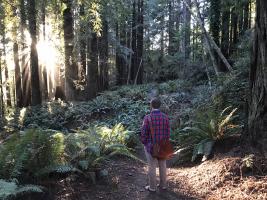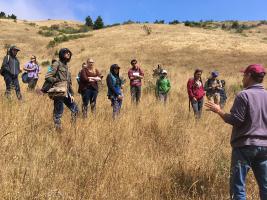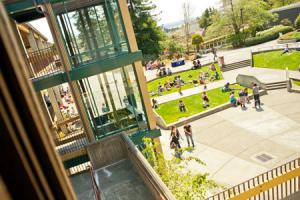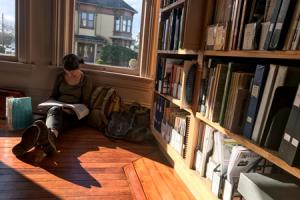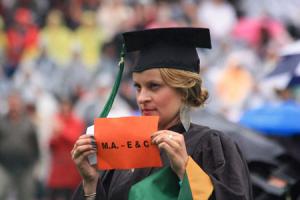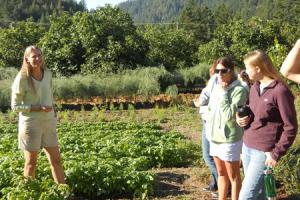Spring 2016
Unless otherwise noted, events are 5:30pm-7:00pm Thursdays in Founders Hall 118 *
February 18
Andrea Tuttle
“Report from Paris: Observations from the UNFCCC COP 21 Climate Negotiations”
Andrea Tuttle works as an advocate for robust forest and climate policies. She participated in the early design of California’s climate program and forest protocols which are now a compliance instrument in the cap-and-trade system. She is a former Director of the California Department of Forestry and Fire Protection and now serves on the boards of the Pacific Forest Trust and U.S. Endowment for Forestry and Communities.
Through her career she has been active in California land-use and environmental policy, serving on the state Coastal Commission, the North Coast Regional Water Quality Control Board and as a principal consultant in the state Senate.
She consults internationally and for the past nine years has attended the UNFCCC climate negotiations as an Observer, especially tracking the REDD+ policies and finance mechanisms to reduce deforestation and degradation in the tropics.
She’s a Cal Berkeley grad with a B.A. in Biological Sciences and Ph.D. in Environmental Planning, and has lived in Arcata with her husband Don since the 1970’s.
This event is a featured presentation of Humboldt’s International Education Week.
March 3
Jonathan Kusel
“Improving Forests and Building Communities: A Networked Biomass Approach”
Jonathan Kusel founded and has for 22 years directed the Sierra Institute for Community and Environment. He received a Masters of Forest Science from Yale University and a Ph.D. from University of California, Berkeley, in natural resource sociology and policy. He participated on the Clinton Administration’s “Option 9” Forest Ecosystem Management Assessment Team, and led the community assessment team and public participation team for the Sierra Nevada Ecosystem Project (SNEP).
More recently, Dr. Kusel sat on the steering committee of the Biomass Economic Recovery Group of the Northern Sierra and was instrumental in the development and success of the California Forest Biomass Working Group. Dr. Kusel and the Sierra Institute are one of the nine members of California’s State Wood Energy Team.
March 24
Lindsay Naylor
“Cultivating Sustainability: Seeds and Climate Change Adaptation in Highland Chiapas”
Watch Full Presentation
Dr. Naylor is a political geographer who uses food and agriculture as a lens to examine human-environment interactions and spaces of resistance. She received her Ph.D. from the University of Oregon and is currently Assistant Professor of Geography at the University of Delaware.
April 7
Nate Coleman
“Ensuring Safe, Compliant and Reliable Interoperable Zep Product Designs for SolarCity Photovoltaic Installations through Rigorous Test, Quality and Qualification Programs”
Nate Coleman is the Vice President of Technical Operations at Zep Solar LLC, a wholly owned subsidiary of SolarCity Corporation. His team is responsible for Product Testing, Product Compliance, Product Quality/Reliability and Technology Development. Nate oversees SolarCity’s module supplier quality program and manages Zep Solar’s technology licensing, testing/reliability and Zep CompatibleTM certification/qualification programs. He is an active participant in codes and standards development and a voting member on the UL 1703 and UL 2703 Standard Technical Panels, the TC 82 Technical Advisory Group, and a member of the NFPA Fire Fighter Safety and PV Systems Task Group that is helping to create rapid shutdown requirements for Article 690.12 of theNEC.
Nate has over a decade of product design, testing and R&D experience with renewable energy technologies and is a CA registered Professional Engineer in Mechanical Engineering. He holds a Bachelor of Science in Environmental Resources Engineering from Cal Poly Humboldt and a Master of Science in Photovoltaic Engineering from the University of New South Wales.
April 14
X̱ʼunei Lance Twitchell
“Indigenous Language Revitalization & The Decolonized University”
X̱ʼunei Lance Twitchell is an Assistant Professor of Alaska Native Languages at the University of Alaska Southeast, where he also develops and coordinates the Alaska Native Languages & Studies Program. He is Tlingit, Haida, Yupik, and Saami, and was born and raised in Alaska. He has a BA in English from the University of Minnesota, an MFA in Creative Writing from the University of Alaska Fairbanks, and is currently in the PhD in Hawaiian and Indigenous Language and Culture Revitalization program at Ka Haka ʻUla O Keʻelilkōlani at the University of Hawaiʻi at Hilo.
X̱ʼuneiʼs research interests are in the Tlingit language, social linguistics, social justice, decolonization of colonial institutions (especially educational ones), tribal governance, Native American rights, Federal Indian Policy, and the health & well being of people in Native America. He helped lead a team of politicians, students, and community organizers & protestors to develop and pass a bill that made the 20 Alaska Native languages official languages in the State of Alaska.
In this talk, he will discuss current activities and trends in language revitalization, especially in Alaska, and how decolonizing institutions serves a key role in those activities. He will talk about the social debt that exists in American History to Native American people, and how ideas can gain momentum into movements that have a chance to keep Native American languages from falling into silence at the hands of American Genocide.
April 21
Renee Byrd
“Punishment’s Twin: Carceral Logics, Abolitionist Critique and the Limits of Reform”
Watch Full Presentation
Dr. Renée M. Byrd is an activist scholar, educator and community organizer, committed to building countercarceral knowledges in pursuit of a world without prisons. Her academic research centers the intersection of race, gender, mass imprisonment and prison abolitionist movement building. Dr. Byrd won an Amnesty International Patrick Stewart Human Rights Scholarship, the Sociologists for Women in Society Chow Green Dissertation Scholarship, as well as the University of Washington’s Graduate Medal. Her current book project is a critique of contemporary prison reforms that leave intact the logics of enslavement at the heart of the global prison industrial complex. Dr. Byrd is also currently working on an experimental film about transformative justice and methods for addressing violence without relying on policing and prisons.
Dr. Byrd received her Ph.D from the Department of Gender, Women & Sexuality Studies at the University of Washington. She is currently an Assistant Professor in the Department of Sociology at Cal Poly Humboldt. Outside of academia, Renée has worked as a legal advocate for women prisoners with Justice Now in Oakland, a family advocate for youth in the Juvenile Justice System and on broader campaign work aimed at building genuine human security. In collaboration with the Ella Baker Center for Human Rights, Renée helped produce the human rights documentary System Failure: Violence, Abuse, and Neglect in the California Youth Authority, which is currently distributed by WitnessNYC. Central to her work is the goal of using research justice and filmmaking not just as methods, but also as tools for building community and social movements.
April 28
Kevin Fingerman and Jerome Carman
“Guiding Northwest California Towards Alternative Transportation Fuels: A Roadmap to 2020 and Beyond”
Dr. Kevin Fingerman is an Assistant Professor of Environmental Science and Management at Cal Poly Humboldt. His research employs life cycle assessment and simulation modeling tools to evaluate the broad-based impacts of transportation energy systems. He has also worked extensively on the water/energy nexus and bioenergy sustainability governance. Kevin serves on the board of the Roundtable on Sustainable Biomaterials, and before coming to Humboldt he worked in Rome for the United Nations Food and Agriculture Organization. He holds MS and PhD degrees from UC Berkeley’s Energy & Resources Group.
Jerome Carman is a recent graduate of the Environmental Systems masters program at Cal Poly Humboldt (Humboldt), where he focused on energy systems engineering with an emphasis on thermodynamic analysis while obtaining his Engineer In Training certificate. Jerome has a diverse background: complimented by a bachelor’s degree in physics, he has published work in both high energy particle physics and atmospheric physics. During his
graduate career at Humboldt he changed his professional focus toward local government planning and policy which resulted in an energy specialist position at the Redwood Coast Energy Authority (RCEA). While at RCEA, Jerome specialized in greenhouse gas emissions inventories, climate action planning, and low carbon transportation fuel planning and implementation. Jerome is now a research engineer with the Schatz Energy Research Center where he manages and assists with a variety of transportation planning and implementation projects that are working to accelerate the adoption of low carbon fuels in Northern California.

